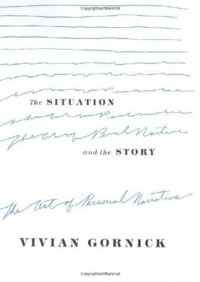Words, Words, Words
A catalog of my comments and thoughts on books, reading, and writing as well as anything I come across that seems interesting. I used to sell other people's words at an independent bookstore but now I hope to get by on selling my own.
"The Situation and the Story," by Vivian Gornick

Vivian Gornick's book on the art of essay writing was bound to get good marks from me, if only for its extensive drawing of examples from famous books and essays.
Criticism — as compared to reviews — is a singularly rewarding experience, especially in the hands of a good writer such as Gornick. It can open your eyes to a new way of seeing a piece you have already read or turn you on to writers you have never experienced. In the course of this book I was turned on to Seymour Krim, I reopened an essay by Joan Didion, and I've hunted down a PDF of Edward Hoagland's "The Courage of Turtles."
The point is theoretically to help in the writing of essays, but I was delighted to discover that what drew me in was perhaps the point all along. Gornick does not reveal until the conclusion her suspicion of studying "craft" (as it were) and the idea that one can teach writing at all. It's not how to write but how to read, critically and with an eye toward story, that drives The Situation and the Story. Gornick is asking the reader to dig deeper, discover what it is about Orwell's "Shooting an Elephant" that makes it compelling.
"Who is speaking, what is being said and what is the relation between the two," is a repeated admonition as you read into a story. Orwell going out and shooting an elephant could be an act of bravado, it could be an act of cruelty, but in the way he writes it is an exploration of colonialism. What it means to represent a ruling nation among a people who aren't keen to have you there, and especially when you're not too keen on the idea either. What does that position do to someone? This comes through in his voice, in the way he describes "the situation" as much as in the actions he takes. Asking these questions will make such readings more enjoyable and meaningful, but should also inform your own work.
The crux of this lies in a story about one of who students writing an essay about her grandfather — a man she has never met. The story isn't quite working until someone realizes that her learning about her grandfather is the situation, it provides a structure for the story, the actions on which the writer can hang meaning. The story, the meaning itself, is actually about the girl connecting with the grandmother. From there the essay starts to come together in a more satisfying way.
I am not convinced with all of Gornick's stances, her belief in the inborn gift of writing skill is maybe just said wrong or maybe it is magical thinking. And the way her distaste for post-modernism is slipped in does not serve any end except to let you know she is not a fan. But if you are interested in personal writing, either to write or read, this is a good place to start.
 1
1
